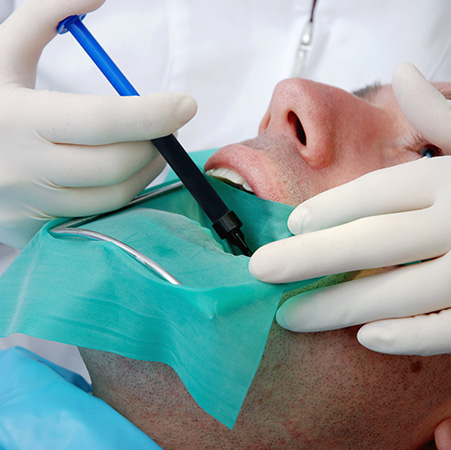When To Get A Root Canal?
A root canal is an option to save any severely diseased or decaying tooth and keep it functional. The big benefit of root canal is that it can save your natural tooth – even if it is considered ‘dead’ – and maintain the natural structure and functionality of your teeth, without any side effects like shifting teeth, or receding jawbone.
Root canal treatment is advisable when a tooth’s soft inner tissue is infected. This sort of infection cannot be treated otherwise as it occurs from within the tooth. An infected tooth can result in a dangerous, and in extreme cases potentially lethal, abscess.
Symptoms that an infection has occurred inside your tooth can be (severe) tooth pain, increased sensitivity to heat or cold, swollen gums around the affected tooth, or noticeable darkening of a tooth’s enamel. It is important to note that, while those symptoms may hint at an infected tooth, their appearance does not necessarily call for a root canal. It is always best to consult with your dentist and have him evaluate your tooth.
It is also worth noting that not all cases of infected teeth can be treated with a root canal. In situations where a tooth is structurally too compromised and unstable, an extraction may be required. However, extracting a tooth will always be our last resort. We will prefer performing a root canal whenever possible, to save your natural tooth and maintain your natural smile.
How Does An St. Laurent, Manor Park & Vanier Root Canal Work?
A root canal treatment, while invasive, is routine for any dentist and usually does not require more than one appointment. In case you are suffering from dentist-related anxiety or elevated stress levels, please make sure to consult with your dentist beforehand and explore your sedation dentistry options.
Your dentist will begin by administering a local anaesthetic to ensure that the treatment will be as pain-free as possible. Should you nonetheless experience any discomfort or pain during the procedure, please make sure to let your dentist know right away.
In the next step, your dentist will open up your tooth and remove the infected pulp from the inside. Once that has been done, the affected area will be rinsed and cleaned to make sure that no residue persists and prevent reinfection. After the area has been properly cleaned, the next step is to replace the tooth’s pulp with a rubber-like material. This will restore some of the tooth’s functionality while at the same time preventing recurring infection.
The last step is to seal your tooth shut again. It may also be advisable to support your new root canal with a dental crown to prevent further exterior damage to the tooth. Make sure to mention the option to your dentist during the initial consultation.
Root Canal Treatment Aftercare
As a root canal is an invasive form of treatment, it is normal to feel a certain level of discomfort and pain once the local anaesthetic wears off. These symptoms can persist for a few days as the tooth’s surrounding area heals. If you are nervous about the level of aftercare pain or discomfort, ask our dentist about the possibility of prescribing pain medication after a root canal treatment.
Should you experience pain and discomfort longer than a few days after the treatment, or notice any concerning bleeding, make sure to consult your dentist right away.
Bytown Dental Is Your Address For Root Canal
Whenever a tooth causes you discomfort or pain, make sure to contact the experts at Bytown Dental. We are ready and able to evaluate the situation and perform the necessary procedures, from fillings to root canals. Even if you require a root canal St. Laurent, Manor Park & Vanier, you will be in the best and most capable hands! For more information on our root canal treatment, make sure to contact us today!


